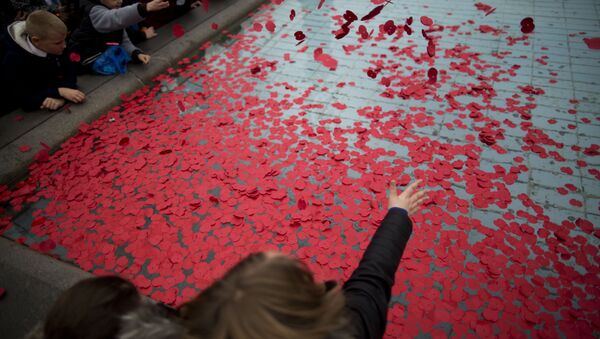Last month Conservative MP Johnny Mercer — who represents a constituency in Plymouth, one of the strongholds of the Royal Navy — said white poppies were "attention-seeking rubbish".
On Sunday, November 11, millions of people around the UK and in other countries will be taking part in ceremonies to mark the 100th anniversary of the end of the First World War.
The First World War claimed the lives of 886,000 British servicemen, mostly in the trenches of the Western Front.
Sales of white poppies have soared this year, despite the trend being described by some as "disingenuous". @ianpaynesport asks: why would you wear one? pic.twitter.com/KRc7CMr0Px
— LBC (@LBC) 4 November 2018
"There are lots and lots of people who are extremely unhappy with the way that the orthodox remembrance ceremonies are operated," Albert Beale, chairman of the Peace Pledge Union, told LBC radio on Sunday, November 4.
"Red poppies are designed by the British Legion to remember the British military dead. The majority of people who get killed in wars are not the military, they're civilians," added Mr. Beale, who insisted his organization did not mean to disrespect anybody.
Red Poppies For Footballers and TV Presenters
Wearing of the red poppy is mandatory for TV presenter on the BBC in the run up to Remembrance Sunday and the poppies have also been sewn into the shirts of English Premier League and lower division teams.
On Saturday, November 3, Stoke City's Irish midfielder James McClean was booed by his team's own fans throughout the goalless draw with Middlesbrough because he publicly refused to wear the poppy on his shirt.
"They have nothing in their whole imperial arsenal that can break the spirit of one Irishman who doesn't want to be broken….Your abuse, your throwing things, your booing, do your worst," said McClean on Instagram after the match, and he also referred to some Stoke fans as "uneducated cavemen".
McClean was born into an Irish republican family in Londonderry, where in 1972 British soldiers shot dead 13 civilian protesters on Bloody Sunday. He refuses to wear the poppy for political reasons.
The row over whether to wear red, white or no poppies at all has become an emotive subject this year as Britain, France, Australia and several other countries commemorate the end of the First World War.
Ironically if you think James McClean should be forced to wear a poppy, you'd probably have been on the other side in WWII.
— poc (@peteoconn) 3 November 2018
"Remembrance is neutral on both the causes and consequences of individual conflicts and is above partisan and political interpretation," a Royal British Legion spokesperson told Sputnik.
"The Legion defends the right to wear different poppies. However, the Legion's red poppy is a symbol of peace inclusive of all regardless of race, belief, origin, or sexual/gender identity. Importantly, the red poppy raises funds to support our armed forces, veterans and their families in their time of need," said the spokesperson.
Just look at the intolerance and hatred on display all because James McClean refuses to wear a poppy. pic.twitter.com/SP8THxKWh8
— Crimes of Britain (@crimesofbrits) 3 November 2018
White Poppies Date Back to 1933
"We see no contradiction in wearing other emblems alongside the red poppy, and recognize the right of any group or individual to express their view within the law. The Legion will take every step to defend the poppy from misappropriation by political, partisan, extremist or commercial interest," she added.
White poppies were first worn in 1933 — during the era of appeasement to Hitler and the Nazis — and the Peace Pledge Union was founded in 1934 as a pacifist organization dedicated to a "warless world".
"Nearly 100 years after the end of the ‘war to end all wars' we still have a long way to go to put an end to a social institution that even in the last decade has contributed to the killing of millions," they say on their website.
The views and opinions expressed in this article are those of the speaker and do not necessarily reflect Sputnik's position.


